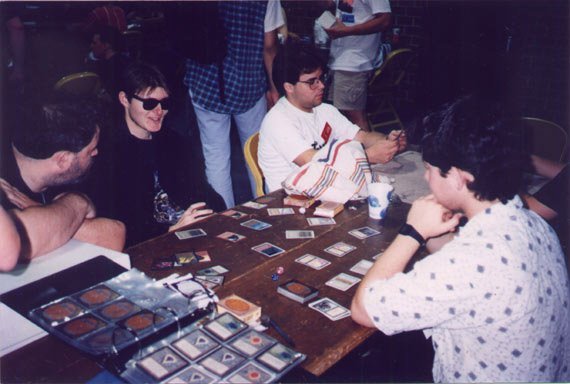Within tabletop games, there is a creator whose name echoes through the halls of game design history – Richard Garfield, the mastermind behind Magic: The Gathering. His journey into crafting this collectible card game wasn’t just a lightbulb moment; it was a mix of different inspirations that birthed a whole new genre. Drawing inspiration from unlikely sources like Strat-O-Matic Baseball, Garfield saw the magic in varied content creating emergent gameplay. He imagined a game where each piece contributes to an ever-evolving experience, much like the players in Strat-O-Matic Baseball shape the narrative of a season.
Garfield’s inspiration didn’t stop there. He pulled in some tricks from Cosmic Encounter, variable player powers. In Cosmic Encounter player gets unique abilities, shaking up the game dynamics. This became the golden rule of Magic: “When a card’s text goes against the rules, the card takes charge.” This gave birth to exception-based games.
Now, like any good nerd at the time, Garfield loved Dungeons & Dragons. It wasn’t just a game; it was a storytelling framework where players created tales in a fantasy world. Dungeons & Dragons gave them tools to craft their adventures, a concept that deeply resonated with Garfield.
Magic’s instant success was no fluke; it sold out everywhere, proving its emergent gameplay and and the ability to inspire creativity in players. Post-Magic triumph, Garfield & WoTC ventured into new territories, including Netrunner. However, this game, while sharing mechanics with Magic, failed to replicate the financial success of its predecessor. The separate paths of Magic and Netrunner would later shed light on the challenges inherent in the CCG market.
The Union of Giants
In 1997, Wizards of the Coast acquired Dungeons & Dragons, merging the worlds of tabletop gaming giants. Shortly thereafter in 1999, Hasbro acquired Wizards of the Coast. This acquisition marked a significant shift, housing these player-driven games within a company that needed to optimize for shareholder return.
Wizards introduced the Open Gaming License (OGL) in the year 2000. This groundbreaking concept allowed third-party creators to contribute and sell content using the Dungeons & Dragons rules. The OGL became a bridge connecting the realms of official and fan-made content.
After over 20 years of the Open Game License (OGL), which brought about games like Pathfinder, a leaked version of OGL 1.1 surfaced in January 2023. This version revealed Wizards’ intention to demand royalties for OGL content and roll back 20 years of open licensing. This revelation coincided with the release of Magic 30, a $1000 box containing 4 booster packs that didn’t even contain “real” cards. This situation clearly illustrates a company prioritizing shareholder interests over player satisfaction.
Now, with all this going on, there’s a cool twist – a community-driven publisher called Null Signal Games. The Netrunner community, burned by the game’s second death due to licensing mess-ups between WoTC and Fantasy Flight, took matters into their own hands. Null Signal Games popped up, breathing life into Netrunner with new cards and a community-driven model. Even Garfield himself is on board with it.
Why not make your own fun?
Making a card game design can be tricky. While Dungeons & Dragons fans effortlessly spin stories, card game creators often hit roadblocks without the right tools. That’s why I’m working on Reliquary, a Figma plugin, to bridge that gap.
Reliquary isn’t just a tool; it’s a way to empower folks to create their own card games. It lets enthusiasts make games with their own rules and flavor. My goal here is to break down barriers and give the community a way to dive into card game design.
Despite all the recent shifts in the card game market, there’s hope in community-driven projects like Null Signal Games and Reliquary. Why not make your own fun? Picture hanging out with friends, like a Dungeons & Dragons session, but this time playing a homemade card game with your own unique cards. The joy of reskinning other CCGs, expanding your favorite worlds, or making your own expansions is easier than ever.

